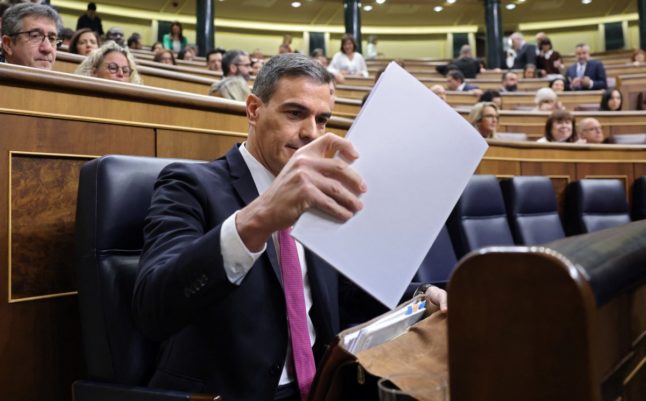Spain votes Sunday after an election campaign dominated by slogans that notably lacked debate about the programmes of the main parties or their hardline allies on whom they will rely to govern.
Polls suggest Alberto Núñez Feijóo and his right-wing opposition Popular Party (PP) will win but without an absolute majority, likely forcing him to seek support from the far-right Vox to govern.
The PP’s 365 proposals are laid out in a 112-page manifesto entitled “Now is the time”.
The Socialist party of incumbent Prime Minister Pedro Sánchez, which is hoping to govern with the radical left-wing Sumar (“Unite”) alliance, has laid out its proposals in a 272-page programme entitled “Forward, a programme for the best Spain”.
The economy: social steps v tax cuts
The Socialists have put a huge emphasis on the government’s economic achievements with the economy expanding by 5.5 percent in 2022 and inflation slowing sharply to 1.9 percent in June, a performance far better than most of Spain’s eurozone neighbours.
The PP has accused the Socialists of ignoring the dwindling purchasing power of families, proposing a temporary reduction in sales tax on meat, fish and tinned goods.
Above all, the party pledges to reduce the tax burden on families, the self-employed and businesses through a “comprehensive reform of the tax system” that will include axing tax on large fortunes.
The Socialists have also promised to consider “extending” the temporary windfall tax on banks, energy firms and large fortunes — a measure Sumar wants to make permanent.
After hiking the minimum wage and reforming the labour market to reduce job insecurity, the Socialists are proposing a “full employment deal agreed with unions and employers groups” and a plan to tackle high youth unemployment.
Although the PP voted against the labour reform, it has since admitted it is “broadly good” and has pledged not to overturn it.
It also pledges to tackle soaring levels of public debt since the pandemic, which has risen above 110 percent of GDP.
It also wants to overturn a newly-approved housing law that caps rental increases.
Environmentally miles apart
A priority for Sumar, ensuring a “just green transition” is also high on the Socialists’ agenda with specific targets for protecting environmental spaces, unlike the PP whose representatives in the European Parliament last week voted against a key biodiversity bill.
Extending the lifespan of nuclear power stations and developing green hydrogen are two of the PP’s flagship energy measures, while the Socialists are focused on renewable energies.
In a country whose key fruit and vegetable exports to Europe depend on irrigation, the question of water is crucial.
The PP has pledged “to bring water where there is none” in a proposal dismissed as “unrealistic” by the left which is insisting on the need for new agriculture models.
For its part, Vox — an outspoken climate sceptic and staunch defender of the rural world and intensive farming — has promised to pull Spain out of the Paris Agreement and overturn its 2021 law on climate change and the green transition.
Divisions over society
The PP’s Feijióo has promised to “overthrow Sanchismo”, a petty slogan aimed at Sánchez’s policies, saying it would involve “overturning all those minority-inspired laws that harm the majority”, the first of which is the legislation on gender self-determination.
He also wants to revise Spain’s updated rape law, which closed a loophole that let more than 1,000 convicted sex offenders secure a reduction in their sentences.
And he wants to change a reform allowing minors aged 16-17 to have an abortion without parental consent, and also amend legislation on assisted suicide.
On immigration, the Socialists want to expand absorption capacities while the PP wants a system of selective immigration and a tightening of border controls.
The PP also wants to overturn the recently-approved democratic memory law aimed at tackling the legacy of the 1936-39 civil war and the dictatorship that followed in order to honour the victims.



 Please whitelist us to continue reading.
Please whitelist us to continue reading.
Member comments